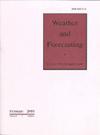Evaluation of Ensemble Snowfall Forecasts using Operationally-used Snow-to-Liquid Ratios in Five Winter Storms
IF 3.1
3区 地球科学
Q2 METEOROLOGY & ATMOSPHERIC SCIENCES
引用次数: 0
Abstract
The prediction of snow accumulation remains a forecasting challenge. While the adoption of ensemble numerical weather prediction has enabled the development of probabilistic guidance, the challenges associated with snow accumulation, particularly snow-to-liquid ratio (SLR), still remain when building snow-accumulation tools. In operations, SLR is generally assumed to either fit a simple mathematical relationship or conform to a historic average. In this paper, the impacts of the choice of SLR on ensemble snow forecasts are tested. Ensemble forecasts from the nine-member High Resolution Rapid Refresh Ensemble (HRRRE) were used to create 24-hour snowfall forecasts for five snowfall events associated with winter cyclones. These snowfall forecasts were derived from model liquid precipitation forecasts using five SLR relationships. These forecasts were evaluated against daily new snowfall observations from the Community Collaborative Rain Hail and Snow network. The results of this analysis show that the forecast error associated with individual members is similar to the error associated with choice of SLR. The SLR with the lowest forecast error showed regional agreement across nearby observations. This suggests that, while there is no one SLR that works best everywhere, it may be possible to improve ensemble snow forecasts if regions where SLRs perform best can be determined ahead of time. The implications of these findings for future ensemble snowfall tools will be discussed.利用五个冬季风暴中实际使用的雪液比评估整体降雪预报
积雪的预测仍然是一个预报挑战。虽然综合数值天气预报的采用使概率制导的发展成为可能,但在建立积雪工具时,与积雪有关的挑战,特别是雪液比(SLR)仍然存在。在操作中,通常假定单反要么符合简单的数学关系,要么符合历史平均值。本文测试了单反的选择对整体降雪预报的影响。利用由9个成员组成的高分辨率快速刷新集合(HRRRE)的集合预报,对5个与冬季气旋有关的降雪事件进行了24小时的降雪预报。这些降雪预报是利用5种单反关系从模式液体降水预报中得到的。这些预报是根据社区协作雨雪网的每日新降雪观测结果进行评估的。分析结果表明,与个体成员相关的预测误差与与单反选择相关的误差相似。预报误差最小的单反在邻近观测中表现出区域一致性。这表明,虽然没有一种单反在任何地方都能表现得最好,但如果单反表现最好的地区可以提前确定,那么就有可能提高整体降雪预报。本文将讨论这些发现对未来整体降雪工具的意义。
本文章由计算机程序翻译,如有差异,请以英文原文为准。
求助全文
约1分钟内获得全文
求助全文
来源期刊

Weather and Forecasting
地学-气象与大气科学
CiteScore
5.20
自引率
17.20%
发文量
131
审稿时长
6-12 weeks
期刊介绍:
Weather and Forecasting (WAF) (ISSN: 0882-8156; eISSN: 1520-0434) publishes research that is relevant to operational forecasting. This includes papers on significant weather events, forecasting techniques, forecast verification, model parameterizations, data assimilation, model ensembles, statistical postprocessing techniques, the transfer of research results to the forecasting community, and the societal use and value of forecasts. The scope of WAF includes research relevant to forecast lead times ranging from short-term “nowcasts” through seasonal time scales out to approximately two years.
 求助内容:
求助内容: 应助结果提醒方式:
应助结果提醒方式:


